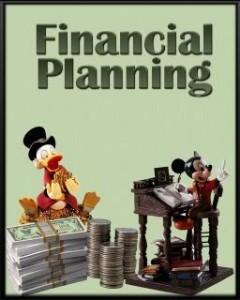Posts Tagged ‘financial adviser’
Posted on: April 27th, 2010 by Amy Bolger
 Having shaken off the jitters of recent stock market downturns, many investors are beginning to re-emerge and re-enter the stock market, or at least become more active with current investments. Many of these people are simply looking to recoup their retirement losses. Entering into the stock market without the proper information or assistance of an investment manager can be a recipe for disaster though. Having shaken off the jitters of recent stock market downturns, many investors are beginning to re-emerge and re-enter the stock market, or at least become more active with current investments. Many of these people are simply looking to recoup their retirement losses. Entering into the stock market without the proper information or assistance of an investment manager can be a recipe for disaster though.
If you choose to venture into the investment marketplace on your own, however, there are a few things to keep in mind. First, you should consider favoring large company stocks over those of smaller firms. If anything were to happen in the future, heaven forbid, larger companies can recover a lot faster than smaller companies. You must also remember that bear markets do happen, and even though we have just gone through 2 terrible ones in the past decade making it seem easiest to just jump ship and bail, you need to hold out in order to beat inflation and reel in returns.
Another thing to keep in mind is to steer clear of long-term bonds. If inflation escalates, which, lets be honest, is very possible because of the Federal deficit, you won’t want to be stuck in an investment where the market will demand higher yields than your bond is paying. If you’re in a higher tax bracket, a good choice would be municipal bonds, which are generally tax free. Those in lower tax brackets may want to invest in taxable bonds, which generally have a higher yield. A financial adviser can help choose the best bonds for you.

Tags: financial adviser, investment manager, investment marketplace, investments, stock market, taxable bonds
Posted in Financial Planning Rockville |
No Comments »
Posted on: April 27th, 2010 by Amy Bolger
 As far as retirement plans go, cash balance plans are definitely not as well known or discussed as traditional 401(k)s with regard to retirement planning. Cash benefit plans are a form of defined benefit plan. Participants are guaranteed a certain amount of money when they reach normal retirement age, and the participant gets to choose from one of three types of distributions: lump sum, single life annuity, or joint and survivor annuity. Cash balance plans are also backed by the Pension Benefit Guaranty Corporation. This means that if the participant’s employer goes under, the PBGC will pay the pension up to the legal limits. As far as retirement plans go, cash balance plans are definitely not as well known or discussed as traditional 401(k)s with regard to retirement planning. Cash benefit plans are a form of defined benefit plan. Participants are guaranteed a certain amount of money when they reach normal retirement age, and the participant gets to choose from one of three types of distributions: lump sum, single life annuity, or joint and survivor annuity. Cash balance plans are also backed by the Pension Benefit Guaranty Corporation. This means that if the participant’s employer goes under, the PBGC will pay the pension up to the legal limits.
As with traditional defined benefit plans, the employer bears all the investment risk. The employer will invest the money in any manner they choose, however they will establish a guaranteed rate at which the employees money will grow by. The nice thing about these plans is that their value never goes down, which is great if there is a volatile stock market.
Now, when it comes time to take the money out, you should discuss your options with your financial adviser to determine where you stand on your retirement savings. Financial advisers will suggest that if you feel you may outlive your assets and don’t want to take on investment risk, you should consider single life annuity or joint and survivor annuity distributions. The annuities provided by the employer do not have the expenses of annuities purchased on the open market. Of course, you can still take a lump sum, especially if you already have many sources of fixed income to pay for your retirement expenses. Before deciding which distribution method is best for you, you really should sit down and analyze your finances and discuss whether or not you have enough to last those 30 years of retirement.

Tags: cash balance plans, financial adviser, retirement planning, retirement plans, retirement savings
Posted in Financial Planning Rockville |
No Comments »
Posted on: April 21st, 2010 by Amy Bolger
 The biggest speed bump that lies in wait for parents on the road to retirement is paying for college. The very utterance of the word “tuition” can strike fear in the hearts of even the most savvy retirement savers. While much attention has been paid to the financial planning for college, many parents still can’t actually pay for college and have to use alternatives to assist them with that tuition bill. One strategy is to have your child take on all or part of the debt themselves by taking out student loans. This may not sound like the “nicest” thing to do, but sometimes it can instill a greater sense of value in the education if they are paying for it themselves. Before you have your child do this though, you should all sit down with a financial adviser to discuss the implications of saddling your child with the debt and make sure they understand the repayment of those loans. The biggest speed bump that lies in wait for parents on the road to retirement is paying for college. The very utterance of the word “tuition” can strike fear in the hearts of even the most savvy retirement savers. While much attention has been paid to the financial planning for college, many parents still can’t actually pay for college and have to use alternatives to assist them with that tuition bill. One strategy is to have your child take on all or part of the debt themselves by taking out student loans. This may not sound like the “nicest” thing to do, but sometimes it can instill a greater sense of value in the education if they are paying for it themselves. Before you have your child do this though, you should all sit down with a financial adviser to discuss the implications of saddling your child with the debt and make sure they understand the repayment of those loans.
When it comes to applying for financial aid, you really need to understand what can be counted as a liability on the FAFSA form. Many parents are unaware that cash value life insurance and annuities of any kind are not counted as assets on the form. This means that shifting assets can become very important to the amount of financial aid you qualify for. This means that parents who have more than $100,000 in taxable liquid assets that they do not want to declare can move the money into an annuity, allowing it to grow tax free until retirement and improve the parents’ implied financial need for the FAFSA form. Therefor, this strategy can help in financial planning for retirement as well as the financial needs for college.
Shifting funds from a custodial account to a 529 plan can improve financial aid chances as well. The College Cost Savings Act of 2007 stipulates that 529 plans that are owned by a third party do not count as assets on the FAFSA. Finally, gifting appreciated assets that you may have will allow for a step-up in cost basis when the student sells the assets and will reduce your declarable assets. You should speak with a financial planner to determine if these strategies will work for you in the given time frame.

Tags: 529 plans, applying for financial aid, fafsa form, financial adviser, financial planning, linkedin
Posted in Financial Planning Rockville |
No Comments »
Posted on: April 20th, 2010 by Amy Bolger
 When shopping for a financial planner, you need to be aware of two misconceptions people have about them. The first misnomer is that the law requires all financial planners to be registered with a government agency. It is very important to know that this is far from the truth. Before deciding on an adviser, always look up the person’s registration at your local state or provincial Business Services Division. Check to see if there are any complaints or if disciplinary action has been taken against them. You should also find out how long that person has been in the profession. A good rule of thumb is to only go with a financial adviser that has been in the business for a minimum of 3-5 years. When shopping for a financial planner, you need to be aware of two misconceptions people have about them. The first misnomer is that the law requires all financial planners to be registered with a government agency. It is very important to know that this is far from the truth. Before deciding on an adviser, always look up the person’s registration at your local state or provincial Business Services Division. Check to see if there are any complaints or if disciplinary action has been taken against them. You should also find out how long that person has been in the profession. A good rule of thumb is to only go with a financial adviser that has been in the business for a minimum of 3-5 years.
The second misconception is that the letters following a person’s name don’t mean much. This is, again, very much untrue. When you are looking for an adviser, give extra credit to those who have designations such as Certified Financial Planner (CFP). To become a CFP, a planner must put in hundreds of hours of studying to pass a grueling 10 hour exam. Furthermore, members are required to undergo background checks, agree to a code of ethics, and complete continuing education to remain certified. While hiring a CFP is not a slam dunk for your situation, at least you know that they are legitimate professionals. Just remember that you need to choose the financial planner that best suits your needs and has passed all of your checks.

Tags: certified financial planner, continuing education, financial adviser, financial planners, misconception
Posted in CPA Rockvile |
No Comments »
Posted on: April 20th, 2010 by Amy Bolger
 Some people have the time, ability, and the drive to manage all their finances, whereas others don’t. If you’re anything like me, you fall into the latter category. Either way though, financial advisers can provide great insight and often not at exorbitant costs. There are many myths out there that prevent too many people from seeking the assistance of financial planners though. One of the biggest misconceptions is that they will only give you advice on investing. Picking the right investments is certainly an important aspect of your personal finances, but its not the only part. Financial planning takes into account all the varied aspects of a person’s life, including taxes, insurance, retirement, budgeting, etc. With the aid of a financial planner who considers your individual situation, you’ll be able to minimize the amount of taxes you pay and have a strong bottom line in the end. Some people have the time, ability, and the drive to manage all their finances, whereas others don’t. If you’re anything like me, you fall into the latter category. Either way though, financial advisers can provide great insight and often not at exorbitant costs. There are many myths out there that prevent too many people from seeking the assistance of financial planners though. One of the biggest misconceptions is that they will only give you advice on investing. Picking the right investments is certainly an important aspect of your personal finances, but its not the only part. Financial planning takes into account all the varied aspects of a person’s life, including taxes, insurance, retirement, budgeting, etc. With the aid of a financial planner who considers your individual situation, you’ll be able to minimize the amount of taxes you pay and have a strong bottom line in the end.
Some people truly believe that only wealthy people need a financial planner. Financial planning is about helping people of all income levels achieve short-term and long-term financial goals. If you are confident enough to make all of these decisions on your own and keep up to date with all the laws relating to investment income and taxation, then more power to you. But if you have a busy life and need the assistance of a financial adviser, make sure you do your homework before choosing one. You should verify certifications and look into their background to make sure you are getting a reliable adviser.

Tags: financial adviser, financial goals, financial planner, financial planners, financial planning, investments
Posted in CPA Rockvile |
No Comments »
Posted on: April 19th, 2010 by Amy Bolger
 There are simple things you may be doing that are easily delaying your retirement by years. Daily financial decisions that you make can directly impact your future, so poor financial habits will keep you working longer. Keeping up with the Joneses is probably one of the worst “habits” you can have. Having the latest and greatest items may make you very happy now, but when you are stuck working an extra 5-10 years, you probably won’t be too pleased. Its simple, just live within your means. Set a budget for yourself and stick to it. There are simple things you may be doing that are easily delaying your retirement by years. Daily financial decisions that you make can directly impact your future, so poor financial habits will keep you working longer. Keeping up with the Joneses is probably one of the worst “habits” you can have. Having the latest and greatest items may make you very happy now, but when you are stuck working an extra 5-10 years, you probably won’t be too pleased. Its simple, just live within your means. Set a budget for yourself and stick to it.
Three of the most expensive habits, that are only going to continue to get more expensive, are smoking, drinking, and gambling. The odds of hitting the jackpot in the lottery are very slim. Instead of spending all that money on tickets, why not put it into an interest bearing account and let it compound; a guaranteed win. A glass of wine may lengthen your lifespan (according to medical research), but if you haven’t saved enough money for that longer life, you will run into problems.
Track how much money you are REALLY spending on entertainment. Entertainment is a huge pitfall for budgets because most of the spending is unplanned. How often do you go back and see how much money you spent at the bar, restaurant, club, or movies. Too often we let these expenditures go untracked and then when our paycheck is gone, we have no idea where it went. The best thing is to just make smart decisions. Bring cash when you go out so you can track exactly what you are spending. Set a budget for yourself and stick to it. All that money you are no longer spending on daily “habits” can add up in the end and it can help get you to an early retirement. If you choose to spend those funds, by all means speak to a financial adviser and choose to invest in appreciable assets.

Tags: budgets, early retirement, financial adviser, financial decisions, keeping up with the joneses, linkedin
Posted in CPA Rockvile |
No Comments »
Posted on: April 16th, 2010 by Amy Bolger
 Many people in the United States don’t start planning for their retirement until well into their working years and even then, are not as prepared as they should be. Never fear, there are some resources that you can turn to help with this responsibility. The first is “The Wall Street Journal Guide to Understanding Money & Investing “(1999). This guide serves as a primer for people that want a well-rounded fundamental investment education about the structure and makeup of the US banking system and the types of investment products that are available to them. Many people in the United States don’t start planning for their retirement until well into their working years and even then, are not as prepared as they should be. Never fear, there are some resources that you can turn to help with this responsibility. The first is “The Wall Street Journal Guide to Understanding Money & Investing “(1999). This guide serves as a primer for people that want a well-rounded fundamental investment education about the structure and makeup of the US banking system and the types of investment products that are available to them.
The second resource to look into is “Essential Guide to Your 401(k) Plan” (2001). This book will teach you about the different types of retirement plans available, the advantages of pretax deferrals versus after-tax investing, the provisions associated with company matching contributions, and the provisions associated with vesting, loans, hardship withdrawals, portability and payout options.
Another useful resource you should check out is “Understanding Wall Street” (1991). This book was written for individuals who know little or nothing about Wall Street, but always wanted to understand it. This book covers the history of Wall Street, including information about investing in individual securities. It also has a separate focus on business analysis, which is beneficial because it provides an overview of income statements and balance sheets in a way that is simple for even the layman to understand.
Finally, you should consider reading “Winning the Loser’s Game” (1998). This book is considered by many to be one of the best investment books ever written because it explains the typical investment mistakes that amateurs tend to make and teaches you how not to make them. This book will not, however, teach you how to invest and the author tells its readers that they should speak to a financial adviser about this rather than making a go at it themselves. The centralized theme to the book is that the key to investment success is not tied to making winning investment decisions, but rather minimizing mistakes.
For many people, the thought of retirement planning is overwhelming, foreign, and difficult to understand. Taking the time to read these books, however, will put you in a better position to understand the basics of retirement planning and enable you to take an active role in the planning and meeting your retirement goals with your financial adviser.

Tags: financial adviser, investment books, investment education, investment mistakes, linkedin, wall street journal
Posted in CPA Rockvile |
No Comments »
Posted on: April 15th, 2010 by Amy Bolger
 Whether you completed your return months ago or are just getting it in at 11:59pm on April 15, you are still relieved to have your return in Uncle Sam’s hands on time. But before you file away your 1040 for good, make a copy of it for your financial adviser. Some careful scanning of this document can help you plan for the future. And that doesn’t just mean adjusting your withholdings or estimated payments or catching missed deductions; it can be a valuable tool to help you determine the best usage of your money, what types of investments might work best for you, and what types of portfolio changes you may want to make. Whether you completed your return months ago or are just getting it in at 11:59pm on April 15, you are still relieved to have your return in Uncle Sam’s hands on time. But before you file away your 1040 for good, make a copy of it for your financial adviser. Some careful scanning of this document can help you plan for the future. And that doesn’t just mean adjusting your withholdings or estimated payments or catching missed deductions; it can be a valuable tool to help you determine the best usage of your money, what types of investments might work best for you, and what types of portfolio changes you may want to make.
One thing to look for on your return is if you have more than $1000 in taxable interest or unqualified dividends, you may want to think about relocating some of those holdings into tax deferred accounts. Another option, if you need to keep those funds readily available, is to look into a stock index fund that covers the total US or international markets. These funds don’t trade holdings often, so they don’t generate many capital gains. You should discuss the tax implications of these funds with your tax adviser first, as the rates are soon to be changing.
You should also look for capital losses that you are able to carry forward to future years. You can use your capital losses to offset your capital gains, so you may be able to make some investment changes without incurring a tax bill. Talking with your financial adviser about your portfolio may help you to determine if you have some investments you want to sell to re-balance the taxable portion of your portfolio or get rid of some high fee mutual funds. But, you shouldn’t just make the changes just for the sake of using up the losses because you can use $3000 each year to reduce your taxable income.

Tags: capital gains, financial adviser, investments, linkedin, tax adviser, tax return
Posted in CPA Rockvile |
No Comments »
Posted on: April 1st, 2010 by Amy Bolger
 Your in your 50s and haven’t saved a dime for retirement, but you have a job – Don’t panic. You still have time to make up some ground. It will require you to make significant changes in your lifestyle now, but they certainly won’t be as painful as the changes you would have to make if you continue to put it off. Any financial planner will tell you that its never too late to start. Your in your 50s and haven’t saved a dime for retirement, but you have a job – Don’t panic. You still have time to make up some ground. It will require you to make significant changes in your lifestyle now, but they certainly won’t be as painful as the changes you would have to make if you continue to put it off. Any financial planner will tell you that its never too late to start.
You have to start by saving. And that doesn’t mean just cutting out your daily Starbucks, that means saving, at the very least, 10% of your gross income. You can do this one of two ways: First, you can pay down high-interest debt that isn’t already tax-deductible – namely credit cards. Or, you can just start socking funds away.
Make sure to take full advantage of the tax codes (see your CPA or financial adviser) when putting your funds away to maximize your return. Take full advantage of your company’s 401(k) plan in which contributions are excluded from your current year’s income. Investments in such retirement funds grow tax-deferred until they are withdrawn. If your company does not offer a 401(k), open an individual retirement account at a mutual fund company or brokerage. If you don’t have an employer pension plan, you can put away up to $6,000 pre-tax each year. You can also fund tax-advantaged retirement savings with a second job or side business. Starting a side business is a good way to maintain income into your retirement as well. You may be able to put your earnings into a special savings plan for the self-employed. As for investing your retirement funds, if you are not well versed in the options, you should speak with an experienced financial adviser to help figure out how and where to invest.
The biggest disadvantage you have to starting your retirement savings late is that you lose out on what would have been compounding interest in the previous years. But even if you are in your 50s, you are still going to be able to take advantage of compounding interest on your investments. Since retirement is estimated to last upwards of 20 years, your investments will still compound and may even double (at a rate of 5%, investments are estimated to double in 15 years). So if you you haven’t started saving yet, now is as good a time as any.

Tags: cpa, financial adviser, financial planner, individual retirement account, retirement savings
Posted in CPA Rockvile |
No Comments »
Posted on: March 31st, 2010 by Amy Bolger
 Before retirement, there are two major things you should discuss with your financial adviser: how to pay off your debt before retirement and what your investment fees will be. Both are advantageous to maximizing your retirement benefits. It is very important to plan to eliminate monthly debts prior to retirement (especially your mortgage) because eliminating the fixed expense cuts down tremendously on the dent those costs will leave on your fixed income. Speaking with a financial adviser will help you make plans to pay off these debt in a respectable amount of time without putting forth your savings toward paying the debts. And lastly, before investing you need to ask the important question, “How much will this cost me?”. Fees and expenses diminish investment return. Avoid investments that charge you higher percentages and bank accounts that charge fees. Your financial adviser and/or a little research can help direct you to the best options. Before retirement, there are two major things you should discuss with your financial adviser: how to pay off your debt before retirement and what your investment fees will be. Both are advantageous to maximizing your retirement benefits. It is very important to plan to eliminate monthly debts prior to retirement (especially your mortgage) because eliminating the fixed expense cuts down tremendously on the dent those costs will leave on your fixed income. Speaking with a financial adviser will help you make plans to pay off these debt in a respectable amount of time without putting forth your savings toward paying the debts. And lastly, before investing you need to ask the important question, “How much will this cost me?”. Fees and expenses diminish investment return. Avoid investments that charge you higher percentages and bank accounts that charge fees. Your financial adviser and/or a little research can help direct you to the best options.

Tags: bank accounts, financial adviser, investment return, investments, retirement benefits
Posted in CPA Rockvile |
No Comments »
|
|
 Having shaken off the jitters of recent stock market downturns, many investors are beginning to re-emerge and re-enter the stock market, or at least become more active with current investments. Many of these people are simply looking to recoup their retirement losses. Entering into the stock market without the proper information or assistance of an investment manager can be a recipe for disaster though.
Having shaken off the jitters of recent stock market downturns, many investors are beginning to re-emerge and re-enter the stock market, or at least become more active with current investments. Many of these people are simply looking to recoup their retirement losses. Entering into the stock market without the proper information or assistance of an investment manager can be a recipe for disaster though.









